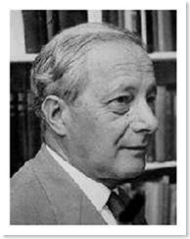During his life, Michael Polanyi (1891-1976), had four careers: a medical doctor, physical chemist, social thinker, and philosopher.
Polanyi was a brilliant scientist with the breadth and depth of mind to know that his observations, enquiries, experiments were never value-free, never wholly objective, never beyond the contingencies of the human. He argued this without peer in books such as “Personal Knowledge,” and in doing so made his most important contribution–that of humanizing scientific inquiry.
As a result, no informed, eyes-open scientific enquiry can hence forth disregard appreciating the role of the individual and the individual’s values in the seeking and finding of truth.
 Polanyi showed that natural science itself, which he knew from the inside, does not and cannot meet the “objectivist ideal,” because it necessarily requires the personal engagement and judgment of the scientist herself. With many examples, he shows how scientific research is an art, and has to do with the deployment of artful skills.
Polanyi showed that natural science itself, which he knew from the inside, does not and cannot meet the “objectivist ideal,” because it necessarily requires the personal engagement and judgment of the scientist herself. With many examples, he shows how scientific research is an art, and has to do with the deployment of artful skills.
But all acts and forms of knowing employ a kind of “art.” Because, “All ‘impersonal’ measurements, readings, observations, ‘data’, etc., have to be personally understood, appraised, and accepted or rejected by the individual (scientist) using his own informed personal judgment.”
It follows of course that we can never completely test our knowledge, for in doing so we acritically rely upon our personal judgment and skills.
And that is of course the stumbling stone of the Science Fundamentalists, as one letter writer to Vue Weekly called them. It is the case, as Polanyi has somewhere said, “We know more than we can tell.” The Sci-Fundies say instead, if we can’t tell it, show it, reproduce it, we can’t know it, ergo, it’s not true, or at best it’s suspect and inferior. Well, let them try that with the Big Bang. (By the way, can you see the Religious-Fundie parallel? If it’s not in the Bible somewhere it’s not true.)
I have no idea what Polanyi would have thought about alternative medicine. I do know that he would have approached it with scientific rigour, but that he would in no way have disregarded it because it hasn’t passed the “objectivist” ideal, or because its rules and methods cannot be explicitly articulated.
But again, as he has shown, neither can what we call natural science pass the “objectivist” ideal. And that, amazingly, remains (S)cience’s dirty little secret, the exposure of which would undermine all so-called Science-backed efforts at marginalizing ancient and newer therapies such as acupuncture and chiropractic and curtailing the importation of plant-based medications. (See this week’s Well, Well, Well.)
There are a number of good bio’s on Michael Polanyi. Here’s just one.
